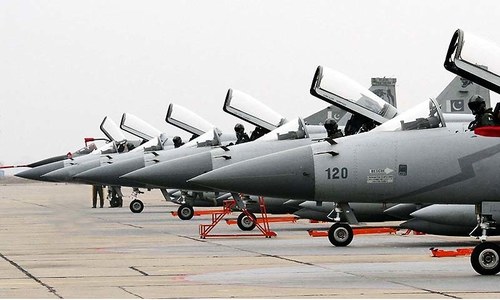India world's sixth largest military spender: report

STOCKHOLM: Despite being the tenth largest arms importer in the world last year, Pakistan did not make it to a list of 15 countries with the highest military expenditure in 2015, compiled by a military think tank.
Pakistan spent $9.5 billion on military expenses, up from its expenditure of $8.7 billion in 2014, according to data published by the Stockholm International Peace Research Institute (SIPRI) on Tuesday.
United States topped the list with a military spending of $596 billion, with China and Russia following. India was placed sixth, up a rank from its position of the previous year.

India's military spending in 2015 was $51.3 billion, an increase of 0.4 per cent since the previous year, said the SIPRI report.
India plans to increase military expenditure by about 8 per cent (in real terms) in 2016, said the report, "partly to fund many large ongoing and planned procurement programmes".
Rising tensions worldwide helped push up military expenditure in 2015, the first increase after four years of declining spending, SIPRI said.
For the full-year 2015, world military spending totalled $1.67 trillion, a rise of one per cent from the previous year.
Examine: S. Arabia, India top arms importers, says Sipri
The increase was attributed primarily to more expenditure in Eastern Europe, Asia and the Middle East, while the decline in spending in the West was levelling off, SIPRI said.
According to SIPRI, military expenditure include all current and capital expenditure on:
- the armed forces, including peace keeping forces
- defence ministries and other government agencies engaged in defence projects
- paramilitary forces when judged to be trained, equipped and available for military operations
- military space activities
Mixed trends
The US remains in pole position as the country that spends the most on its armed forces, by far. Washington's military spending budget of $596 billion was down by 2.4pc from the previous year, a smaller decline than in recent years.

SIPRI senior researcher Sam Perlo-Freeman said the US now has “additional overseas contingency operations' (OCO) spending from the war against” the militant Islamic State (IS) group.
The world's second-biggest spender, China, dished out $215 billion, followed by Saudi Arabia which overtook Russia for third place at $87.2 billion. Moscow spent $66.4 billion.
Afghanistan cut its military spending by 19pc to $199 million in 2015, "which is perhaps surprising as Afghan forces have assumed responsibility for security following the withdrawal of most foreign troops", said SIPRI.
However, it noted, that Afghanistan's military received aid from foreign donors to the tune of $5.35 billion last year.
During the 10-year period from 2006-2015, the US military budget shrank by four per cent, while China's soared by 132pc. Those of Saudi Arabia and Russia also increased significantly, by 97 and 91pc respectively.

France, which had the fifth biggest budget in 2014, fell to seventh place behind Britain and India. Military spending budgets continued to decline across Western Europe, albeit less sharply than in recent years.
“The reasons for the change in trend are Russia, IS and Nato politics," Perlo-Freeman said, noting that Alliance members have agreed to maintain spending at two per cent of their gross domestic product until 2024.
In Asia, rising spending in Indonesia, the Philippines, Japan and Vietnam reflected tensions with China and North Korea, SIPRI said.













































